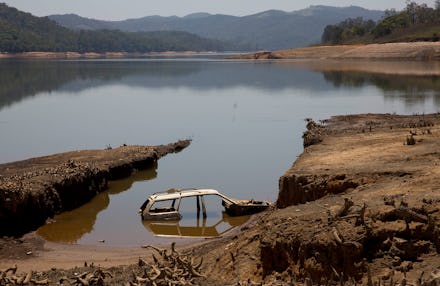South America's Largest City Could Be Out of Water in a Week Thanks to Craven Politicians

The news: South America's wealthiest and largest metropolis may run out of water within a week as months of drought have gutted the city's water supplies. And it's the city's elected officials who have hastened this crisis by putting political priorities over the needs of citizens.
The prolonged drought is currently threatening the water supply in the state of São Paulo, Brazil's most populous with more than 40 million people. More than 14 million people have already been forced to ration their supplies of water because of the shortages, the Thomson Reuters Foundation reports. Dilma Pena, CEO of state-owned water utility Sabesp, warned officials last week that São Paulo only has about two weeks of drinking water supplies left.
"If the drought continues, residents will face more dramatic water shortages in the short term," Vicente Andreu, president of Brazil's National Water Agency, told reporters in São Paulo.
The drought: The primary cause of the drought is climate change and severe deforestation in the Amazon. Between August 2012 and July 2013, deforestation jumped by 29 percent. Satellite imaging also revealed that the Amazon lost 2,275 square miles of forests in that period, an area nearly five times the size of New York City, Thomson Reuters Foundation reports. With fewer trees, the Amazon's capacity "to work as a water pump, absorbing moisture from the Atlantic Ocean and releasing millions of liters of humidity into the air," is being reduced, scientists said.
Compounding problems, Brazil's biggest reservoir, the Cantareira reservoir system, is showing signs of potential collapse. The reservoir provides about half of São Paulo's water supply. As of Oct. 23, the Cantareira system was operating at only 3 percent of its capacity, which Climate Central points out is "essentially dead water." São Paulo's water utility, Sabesp, was only able to extract the remaining water after constructing an extra 2 miles of pipeline to the center of Cantareira.
"If it doesn't rain, we run the risk that the region will have a collapse like we've never seen before," Andreu later told state lawmakers, according to Bloomberg.
Elected officials did nothing to stem this crisis. Despite the looming water crisis, it seems that political posturing ahead of the national elections was of greater importance for elected officials than securing the water supply for millions of people.
Sunday's presidential election led São Paulo Gov. Geraldo Alckmin to delay any action for fear the party would lose votes, the Reuters foundation reports.
Critics allege that the region's state-run water utility declined to implement water-rationing measures despite orders from federal officials. Municipal water managers had insisted that smaller measures — like offering discounts to people who cut their water use — would be adequate. They were wrong.
"It is now clear that our policies on management of water resources are unsustainable," climate scientist Marcos Heil Costa told NASA. "No city in southeast Brazil seems prepared to handle a drought like this one. It is a mix of a lack of preparation for low levels of rain and a lack of environmental education in the population. Most people continue to use water as if we were in a normal year."
Why you should care: São Paolo's looming water crisis is a glaring example of institutions failing to help the people it claims to serve. And it's a sad story that may seem familiar to residents of one U.S. city.
Water service cutoffs in Detroit have been underreported in the media and solutions are lacking. To reduce $90 million debt, the Water and Sewerage Department ordered shut offs for customers who owed $150 or more or who were at least two months late on their payments, National Geographic reported. Since March 1, nearly 19,500 Detroiters have had their water service interrupted.
Protests erupted across Detroit, and the city received a warning in June from the United Nations, declaring the shut offs a violation of human of rights.
Despite the cultural and vast geographic distance between São Paulo and Detroit, aspects of city life bond the two cities. No one should go thirsty or lack access to basic sanitation because of corruption, a lack of political will and bureaucratic mismanagement.